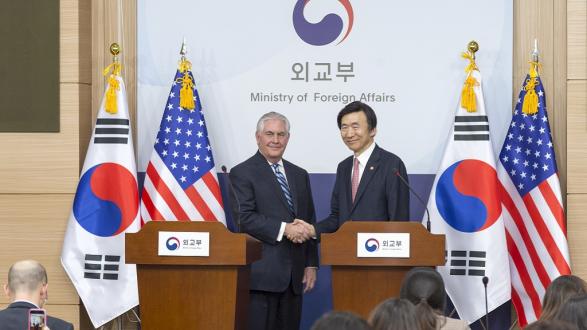Between 2002 and 2012, two-way trade between South Korea and the United States increased 84 percent. Since the U.S.-Korea Free Trade Agreement (USKFTA) came into force in March 2012, nearly 95 percent of all bilateral tariffs have been eliminated. The United States is now South Korea’s second largest trading partner, and South Korea is the sixth largest trading partner of the United States.
However, President Donald Trump’s decision to withdraw from the Trans-Pacific Partnership (TPP) and renegotiate the North American Free Trade Agreement (NAFTA) as part of his "America First" foreign policy, as well as disputes in the Northeast Asian region, pose challenges to the future of USKFTA and regional commerce between Northeast Asian economies.
What will U.S. withdrawal from the TPP mean for Northeast Asia? How can the region overcome its ongoing disputes and achieve cooperation? What has the USKFTA accomplished and where does it stand with the new administration? A panel of experts at the SeouLA Forum on March 31 will discuss.
Background
- South Korea is the first Northeast Asian free trade partner of the United States. Since the USKFTA came into effect, trade between the United States and South Korea has risen from $126.5 billion in 2011 to $145.2 billion in 2014, and 2015 had increases in U.S. exports in manufactured goods and agricultural products.
- Whether Washington will continue to support the USKFTA remains to be seen: Trump denounced U.S.-Korea FTA as a "job killing trade deal" during the 2016 presidential campaign.
- Ongoing disputes in Northeast Asia — such as the Senkaku/Diaoyu Islands conflict between China and Japan, comfort women issues and the Dokdo islands dispute between Korea and Japan, and contemporary political disputes like South Korea’s deployment of the THAAD missile system — hinder regional commerce and cooperation.
- According to the East Asia Forum, in order to boost Northeast Asian cooperation, China, South Korea, and Japan should take a more proactive approach. Cooperation efforts should entail joint development of energy resources, guidelines for nuclear safety and energy-saving measures, food security, and safety of sea lines of communication.
Looking Ahead: SeouLA Forum 2017
Speakers in this session at the SeouLA Forum on March 31 will include Taeho Bark, professor at Seoul National University; Byung-il Choi, professor at Ewha Women’s University; Clara Gillispie, senior director of trade, economic, and energy affairs at the National Bureau of Asian Research; Yong Suk Lee, fellow at the Freeman Spogli Institute for International Studies; and Yunjong Wang, adjunct professor at Catholic University of Korea.
Stay tuned for results of the discussion.
Meanwhile, share your own opinion on social media: Can free trade help Northeast Asia overcome historic disputes and achieve regional cooperation? Join the conversation on March 31 by tweeting at us @PacCouncil and using #SeouLA.




